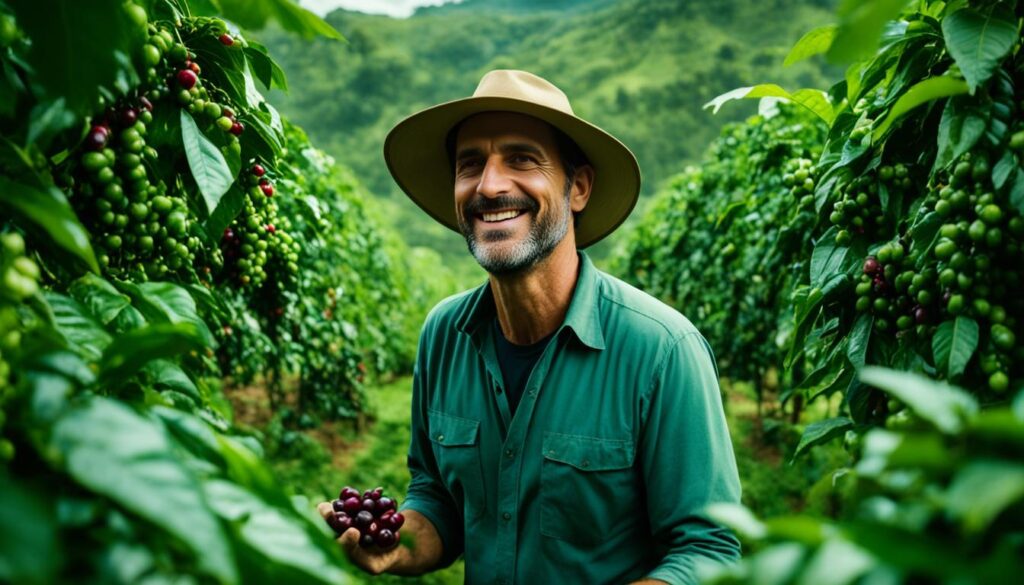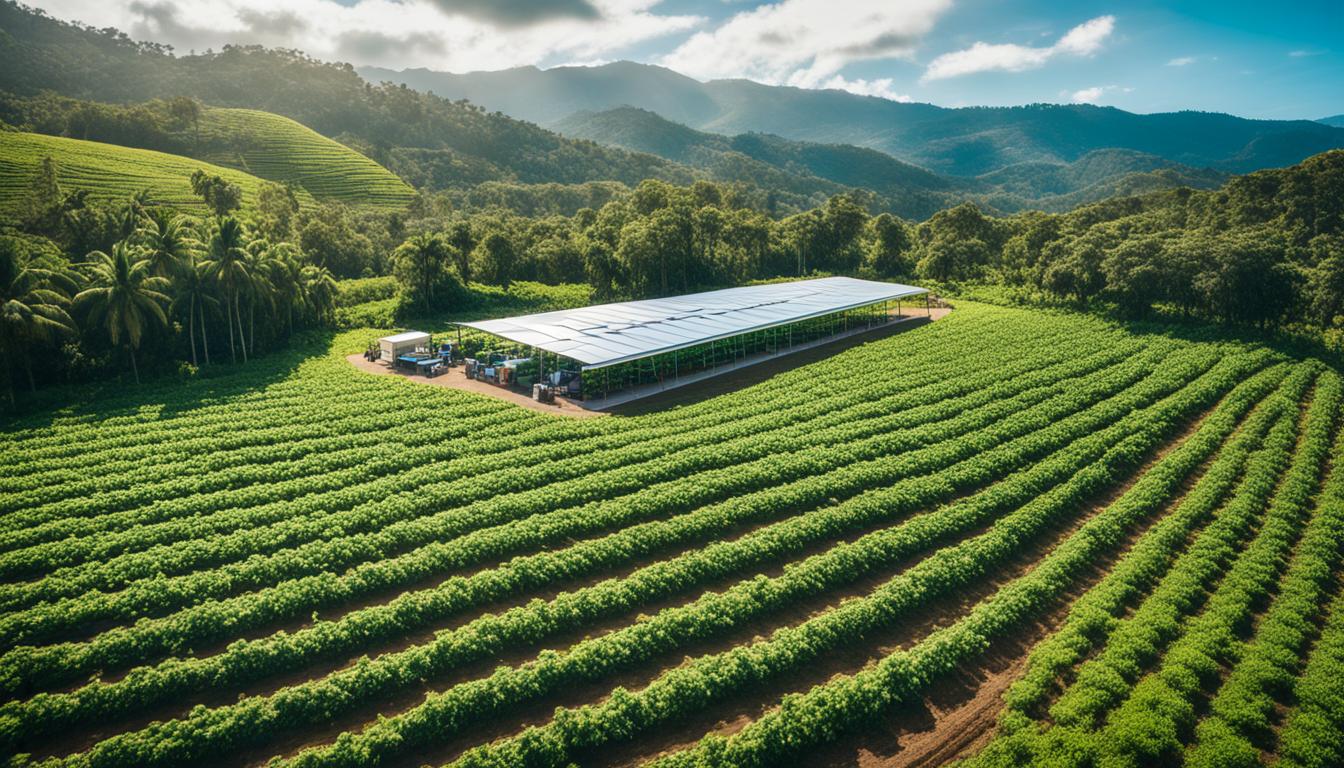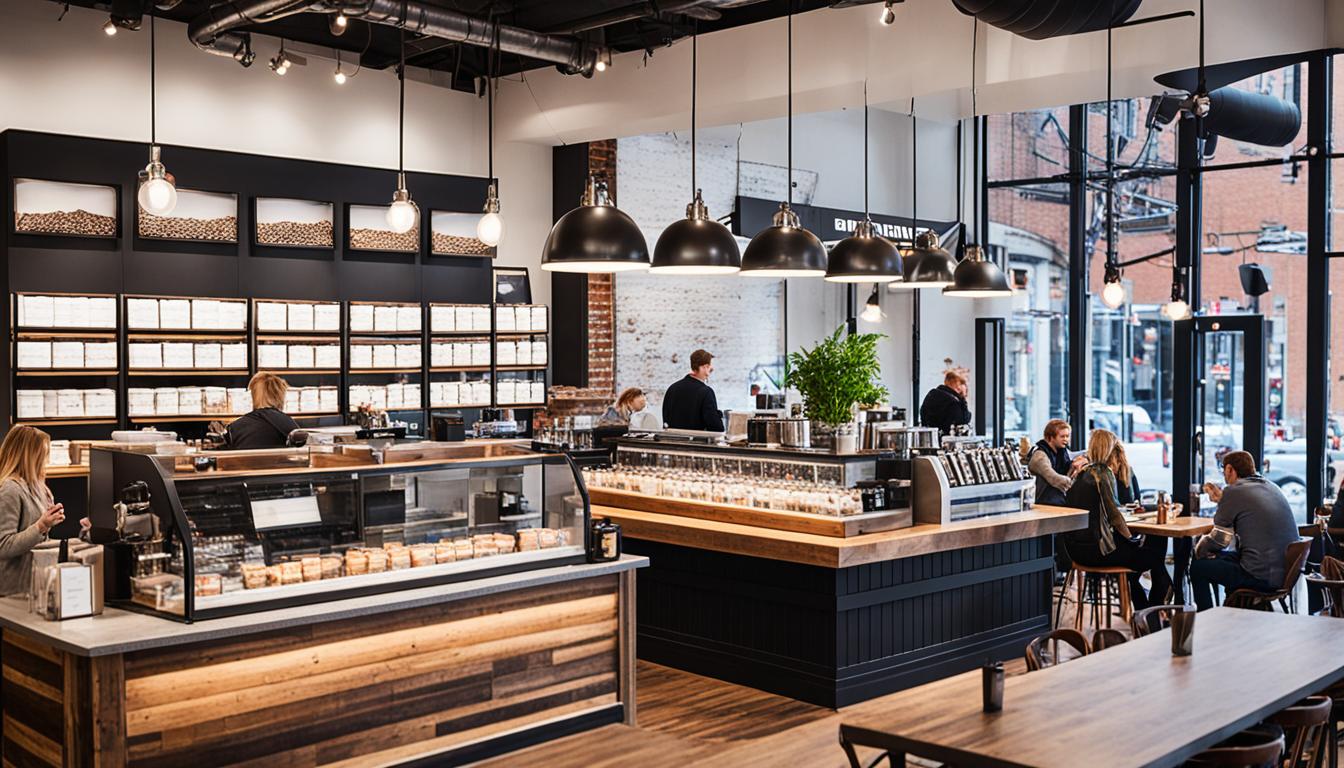The specialty coffee trend has taken the industry by storm, and one particular aspect has captured the attention of coffee enthusiasts: single-origin coffee. This unique and flavorful brew has been gaining immense popularity in cafes worldwide, driving a significant shift in the coffee market. With its distinct characteristics and taste, single-origin coffee has become a favorite among millennials and coffee connoisseurs.
One of the factors contributing to the surge in single-origin coffee’s demand is the COVID-19 pandemic. The closure of cafes and restaurants led to an increased preference for home brewing, including single-origin instant coffee. Consumers sought high-quality coffee beans that could recreate the cafe experience at home, and single-origin options perfectly fit the bill. This shift in consumer behavior further boosted the already growing popularity of single-origin coffee.
Aside from the pandemic, the rise in single-origin coffee can also be attributed to consumers’ preference for clean label and organic products. Single-origin coffee offers transparency in its sourcing, allowing consumers to know exactly where their coffee comes from. This traceability appeals to those who value quality and want to support direct trade coffee practices. Moreover, the emphasis on flavor and the absence of harmful chemicals like pesticides make single-origin coffee an excellent choice for health-conscious individuals.
The global single-origin coffee market is competitive and continuously evolving. Key players in the industry are focusing on product innovation and building trust among consumers. From premium coffee beans meticulously sourced from specific regions to artisanal roasting techniques, these players aim to provide coffee enthusiasts with exceptional single-origin coffee experiences.
Key Takeaways:
- Single-origin coffee is gaining popularity in cafes due to its unique characteristics and taste.
- The COVID-19 pandemic has further fueled the demand for single-origin instant coffee as consumers shifted to home brewing.
- Millennials, who rely on coffee for energy, are driving the market for single-origin coffee.
- Consumers appreciate single-origin coffee for its high-quality flavor and preference for clean label and organic products.
- The global single-origin coffee market is competitive, with key players focusing on product innovation and building trust among consumers.
The Appeal of Single-Origin Coffee
Single-origin coffee is appealing to consumers for several reasons. Firstly, consumers like to know the origin of the coffee they’re drinking, and single-origin coffee provides clear traceability. It allows them to connect with the unique story behind each cup and appreciate the craftsmanship involved. Single-origin coffee is often sourced from specific regions or farms, showcasing the diversity and flavors that different coffee-growing areas have to offer.
One of the major benefits of single-origin coffee is its perceived higher quality compared to coffee blends. With single-origin coffee, the beans are carefully selected and roasted to bring out the distinctive characteristics of a particular origin. This attention to detail results in a more refined and flavorful cup of coffee, appealing to both casual coffee drinkers and connoisseurs alike.
Moreover, single-origin coffee is often free of chemicals like pesticides, mycotoxins, and mold, making it a healthier choice. Consumers who prioritize their well-being are drawn to single-origin coffee for its clean label and organic attributes. They can enjoy their coffee without worrying about potential contaminants or additives.
The unique flavor notes and body of single-origin coffee make it a favorite among coffee enthusiasts and professionals. Each origin has its own distinct flavor profile, influenced by factors such as altitude, soil composition, and climate. From the fruity and floral notes of Ethiopian coffee to the rich chocolatey flavors of Colombian coffee, single-origin coffee offers a world of taste experiences to explore.
Artisanal coffee roasters play a key role in sourcing and roasting high-quality single-origin coffee. They work closely with coffee farmers, building strong relationships to ensure a consistent supply of premium beans. These roasters value transparency and prioritize ethical sourcing practices, often opting for direct trade relationships with farmers. This direct connection means that the farmers receive fair compensation for their hard work, leading to sustainable coffee production and a positive impact on the coffee-growing communities.
“Single-origin coffee allows us to highlight the distinct flavors and characteristics that each region has to offer. We take pride in sourcing our beans directly from farmers who share our commitment to quality and sustainability. This ensures that our customers can enjoy the finest single-origin coffee with a clear conscience.”
Overall, single-origin coffee appeals to consumers for its traceability, higher quality, health benefits, unique flavors, and ethical sourcing practices. The combination of these factors makes single-origin coffee a preferred choice for those seeking a more refined and enjoyable coffee experience.
Growing Market for Single-Origin Coffee
The market for single-origin coffee is experiencing steady growth, driven by an increasing demand for traceability and unique coffee experiences. European coffee consumers, in particular, are becoming more knowledgeable about their coffee products and seeking clear origin information. Unlike coffee blends, single-origin coffee offers distinct qualities and a transparent story that resonates with consumers.
“Coffee blends often lack the clear origin and unique qualities found in single-origin coffee.”
This demand for single-origin coffee was further amplified by the COVID-19 pandemic. As cafes and restaurants temporarily closed, consumers turned to single-origin instant coffee for a premium coffee experience at home. This shift in consumer preference led to the development of innovative products, such as single-origin instant coffee packaged in eco-friendly materials, catering to sustainability-conscious consumers.
The growing reliance of Millennials on coffee beverages as a source of energy has also contributed to the market’s expansion. With their increasing purchasing power and preference for specialty and premium products, Millennials are driving the demand for single-origin coffee.
The single-origin coffee market is highly competitive, with both global and regional players offering a wide range of products. Coffee industry insights suggest that the market size for single-origin coffee is expanding, presenting opportunities for businesses to cater to the evolving preferences of coffee enthusiasts.
To illustrate the growth and impact of the single-origin coffee market, the following table provides insights into the European coffee consumers and their demand for single-origin coffee:
| Insight | Description |
|---|---|
| European Coffee Consumers | An increasing number of European coffee consumers are demanding traceability and clear origin information for their coffee products. |
| Single-Origin Coffee Demand | The demand for single-origin coffee is rising, driven by its unique qualities and transparent sourcing practices. |
| Coffee Market Size | The market size for single-origin coffee is expanding, creating growth opportunities for coffee businesses. |

These insights highlight the growing market for single-origin coffee and emphasize the importance of catering to European consumers’ preferences. To capitalize on this trend, businesses should offer high-quality single-origin coffee options and provide clear origin information to meet the demands of knowledgeable and discerning coffee enthusiasts.
The Importance of Traceability in Single-Origin Coffee
Traceability plays a vital role in the single-origin coffee market. As coffee lovers become more conscious of the origin and quality of their beans, they seek full transparency in the coffee supply chain. Single-origin coffee provides this traceability, allowing consumers to understand the journey of their coffee beans from its origin to their cup.
By knowing the coffee’s origin, consumers can delve into its flavor profile and appreciate the impact of different growing conditions. Single-origin coffee showcases the unique characteristics of a specific region or farm, resulting in distinct flavor notes and aromas. Whether it’s the fruity acidity of a Kenyan coffee or the chocolatey richness of a Brazilian bean, each origin brings its own delightful nuances to the coffee experience.
What sets single-origin coffee apart from blends is its focus on sustainability and purity. Single-origin beans are often cultivated using sustainable practices, ensuring that the coffee is free from harmful chemicals. This commitment to ethical sourcing resonates with consumers who value the environment and their own well-being. With single-origin coffee, they can enjoy their favorite beverage with the reassurance that it is both ethically and responsibly produced.
On the other hand, coffee blends may lack the same level of traceability and clarity regarding origin and flavor profile. Blends often combine beans from different regions, which can result in a homogenized taste and diminish the distinctiveness that single-origin coffee offers. For those seeking to savor the unique characteristics of coffee from a specific origin, single-origin is the way to go.
“Single-origin coffee allows coffee enthusiasts to embark on a sensory journey, exploring the diverse range of flavors and aromas that each region has to offer. It’s like taking a trip around the world through your coffee cup.” – Coffee connoisseur
The Flavorful Journey of Single-Origin Coffee
When it comes to single-origin coffee, flavor is key. The traceability it offers allows coffee enthusiasts to understand the intricate connection between geography, climate, and flavor. Each coffee-growing region has its own unique set of conditions, from altitude and temperature to soil composition and rainfall, influencing the way the coffee beans develop.
The diverse flavor profiles of single-origin coffee are a testament to the rich tapestry of coffee-growing regions around the world. From the bright citrus notes of Ethiopian coffee to the nutty undertones of Colombian beans, each origin imparts its characteristic flavor profile. Coffee enthusiasts are constantly on the lookout for new origins to explore, immersing themselves in the terroir of different regions and experiencing the nuances of taste that each has to offer.
The Impact of Traceability on Consumer Confidence
The traceability provided by single-origin coffee breeds consumer confidence. As the demand for transparency and ethical sourcing grows, consumers want to know that their coffee comes from a reputable source. Single-origin coffee provides them with the assurance that their coffee beans are carefully selected and grown with respect for the environment and the communities involved.
The assurance of traceability in single-origin coffee extends beyond just the bean itself. It encompasses the entire supply chain, from the farmers and cooperatives at the origin to the roasters and retailers. This complete transparency builds trust between the consumer and the coffee brand, fostering a deeper connection and a sense of shared values.
In a world where consumers are increasingly conscious of the impact of their choices, single-origin coffee satisfies the need for ethically sourced and sustainable products. By embracing traceability, single-origin coffee empowers coffee lovers to make informed decisions and support responsible practices.
The Climate and Diversity of Single-Origin Coffee
Single-origin coffee, sourced from various countries and regions, offers a rich diversity of flavors influenced by their unique climates and growing conditions. The climate, water availability, shade, and terroir of each coffee-growing region all contribute to the distinctive characteristics and tasting notes found in single-origin coffee.
For instance, an arid climate can produce coffee beans with different flavors compared to those grown in a humid climate. These diverse growing conditions give rise to a myriad of flavors, enabling coffee enthusiasts to explore and discover their preferred taste profiles.
Factors such as altitude, temperature variations, and agricultural techniques further shape the taste and quality of single-origin coffee. From the highlands of Colombia to the mountains of Ethiopia, each region leaves its mark on the coffee it produces.
Flavor Profiles
The characteristics of single-origin coffee are heavily influenced by the natural environment in which it is cultivated. Coffee from regions with volcanic soil, for example, may exhibit a subtle acidity and a bright, fruity flavor. In contrast, beans grown in a cooler climate might develop a more delicate body and a hint of floral or herbal notes.
“The growing conditions and terroir of each coffee region have a profound impact on the final flavor profile of the beans. It is fascinating to taste the distinct nuances and explore the sensory journey offered by single-origin coffees from different origins.”
Whether it’s the chocolaty sweetness of beans from Central America or the wine-like acidity of African coffees, the expansive range of flavors found in single-origin coffee enriches the tasting experience and delights coffee lovers around the world.
Exploring Coffee Terroir
In the same way that wine connoisseurs appreciate the influence of terroir on wine, coffee enthusiasts recognize the impact of terroir on single-origin coffee. Terroir refers to the unique combination of climate, soil composition, and geographical features that shape the flavor profile of agricultural products, including coffee. These varying terroirs contribute to the distinct characteristics and complexities found in single-origin coffee.
Coffee lovers can embark on a sensory journey by exploring the subtle nuances and distinct taste notes associated with different coffee-growing regions. From the volcanic slopes of Guatemala to the rainforests of Brazil, each terroir imparts its own charm and distinctiveness to the coffee beans it produces.
As consumers seek new and exciting flavor experiences, the climate and diversity of single-origin coffee serve as a gateway to a world of delightfully unique and characterful brews.
The Ethical Aspect of Single-Origin Coffee
When it comes to single-origin coffee, there is an inherent ethical aspect that appeals to consumers. In today’s conscious consumer culture, people are increasingly concerned about the origins of their products and the impact of their purchase decisions. Single-origin coffee provides a unique opportunity for coffee drinkers to support growers and ensure fair pay throughout the coffee supply chain.
Specialty coffee, often synonymous with single-origin coffee, is produced by experienced farmers who have honed their skills to cultivate the finest coffee available. By choosing single-origin coffee, consumers directly contribute to the livelihoods of these dedicated and passionate farmers. In fact, many single-origin coffee farmers earn more income than fair trade farmers, which further incentivizes the production of quality coffee.
Moreover, single-origin coffee production often incorporates sustainable practices that prioritize environmental conservation and social responsibility. Many small-scale farmers who grow single-origin coffee adhere to sustainable coffee production methods, such as organic farming and shade-grown cultivation. This approach not only ensures the preservation of delicate ecosystems but also safeguards the well-being of farming communities.
Supporting single-origin coffee has a positive ripple effect on coffee farmers and their families, offering economic stability and opportunities for education. By valuing and purchasing single-origin coffee, consumers make a tangible impact on the communities that rely on coffee production for their livelihoods. These ethical choices align with the principles of fair trade and sustainable development, making single-origin coffee a powerful tool for creating positive change within the coffee industry.

In summary, the ethical aspect of single-origin coffee encompasses fair trade practices, supporting coffee farmers, and promoting sustainability throughout the coffee supply chain. By choosing single-origin coffee, consumers can enjoy their favorite beverage while making a positive impact on the world, one cup at a time.
Conclusion
The popularity of single-origin coffee is witnessing significant growth in response to the increasing consumer demand for traceability, quality, and unique flavors. With a projected compound annual growth rate (CAGR) of 8.25%, the single-origin coffee market is poised for substantial expansion in the coming years.
Consumers are increasingly drawn to single-origin coffee due to its array of health benefits, diverse flavor profiles, and ethical sourcing practices. The emphasis on traceability allows consumers to make informed choices, opting for coffee that aligns with their preferences and values.
Artisanal coffee roasters play a pivotal role in the production and distribution of single-origin coffee, ensuring the availability of high-quality and distinct offerings. Their contributions, combined with the efforts of global and regional players, have resulted in a competitive market, offering consumers a wide variety of single-origin coffee products to choose from.
As consumer knowledge and expectations continue to evolve, the single-origin coffee trend is set to thrive, driven by the desire for quality, transparency, and sustainability in the coffee industry. With its promising market growth and growing consumer demand, single-origin coffee is poised to shape future coffee industry trends.
FAQ
What is single-origin coffee?
Single-origin coffee refers to coffee beans that come from a specific country, region, or estate. It is not blended with beans from other sources, allowing for a unique flavor profile and traceability.
Why is single-origin coffee popular?
Single-origin coffee is popular because consumers appreciate the clear traceability and unique flavors associated with coffee from a specific origin. It is often perceived as higher quality and is free of chemicals, making it a healthier choice. Artisanal coffee roasters play a key role in sourcing and roasting high-quality single-origin coffee.
Is the market for single-origin coffee growing?
Yes, the market for single-origin coffee is growing steadily. European coffee consumers are becoming more knowledgeable and demanding more traceability in their coffee products. The COVID-19 pandemic also led to an increase in demand for single-origin instant coffee.
Why is traceability important in the single-origin coffee market?
Traceability is important because consumers want to know the origin and flavor profile of their coffee. Single-origin coffee allows for full traceability, providing consumers with a clear understanding of the coffee’s journey from the origin to the cup.
How does the climate affect the taste of single-origin coffee?
The climate, access to water, shade, and terroir in each coffee growing region play a significant role in the flavor profile of single-origin coffee. Each origin has its own unique characteristics and tasting notes, allowing coffee enthusiasts to explore different flavors.
Is there an ethical aspect to single-origin coffee?
Yes, there is an ethical aspect to single-origin coffee. It is often produced using sustainable practices and supports small-scale farmers and their families. By choosing single-origin coffee, consumers contribute to the economic well-being and education of these farmers.
What is the future outlook for the single-origin coffee market?
The single-origin coffee market is projected to continue growing due to increasing consumer demand for traceability, quality, and unique flavors. Artisanal coffee roasters and key market players are focusing on innovation to meet consumer preferences.




